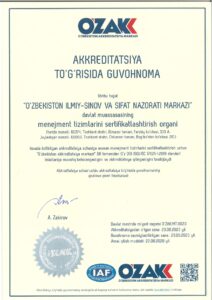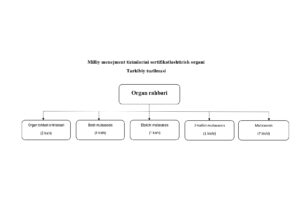Head of the Body:
Nuritdinov Jamshid Rakhimovich
Phone: +998 90 716 12 21
E-mail: management@uztest.uz

- Uz DSt ISO 9001:2015 «Quality Management Systems. Requirements»
- Uz DSt ISO 14001:2019 «Environmental Management Systems. Requirements with guidance for use».
- Uz DSt ISO 45001:2020 «Occupational Health and Safety Management Systems. Requirements».
- Uz DSt ISO 22000:2019 “Food Safety Management Systems. Requirements”
- Uz DSt ISO/IEC 50001:2019 “Energy Management Systems. Requirements with guidance for use”.
SECURITY POLICY
“UzTest” DM Management Systems Certification Body understands the importance of maintaining impartiality during certification, manages conflicts of interest, and guarantees impartiality in carrying out certification activities.
The policy is the basis for ensuring proper functioning and improvement of the quality management system, as well as impartial and competent performance of work. The policy is mandatory for application by all employees of the certification body.
To ensure compliance with the principle of impartiality, the body undertakes the following commitments:
- Carry out activities strictly in accordance with the legislation of the Republic of Uzbekistan, requirements of national and international accreditation bodies, and relevant schemes and rules of certification systems;
- Be responsible for the impartiality of certification activities and prevent any commercial, financial, or other pressure that could compromise impartiality;
- Identify and manage threats to impartiality;
- Ensure impartiality in the certification process, including applying rules and procedures for decision-making, impartial execution of work, and non-discriminatory access to certification services.
The top management represented by the Director and Head of the certification body takes responsibility for ensuring impartiality in certification activities.

To prepare a proper commercial proposal, we kindly ask you to fill out the questionnaire as detailed as possible ![]()
Submit an application for management system certification
Link to the accreditation scope
MANAGEMENT SYSTEMS CERTIFICATION BODY
The Certification Body for Management Systems carries out certification works according to the international standards ISO 9001, ISO 14001, ISO 22000, ISO 45001, and ISO 50001 within the scope of accreditation. The staff of the certification body consists of highly qualified specialists with many years of experience. Certificates issued by the “UzTest” DM Management Systems Certification Body are recognized internationally and included in the IAF (International Accreditation Forum) database. In 2024, the “UzTest” DM Management Systems Certification Body became an affiliated member of IQNet (International Certification Network).
OBJECTIVES IN THE FIELD OF QUALITY MANAGEMENT
(2024-2025)
| № | Objective | Responsible Executor | Preparation Deadline |
| 1 | Study feedback from 10% of certified enterprises’ consumers | Head of CB | End of 2025 |
| 2 | Train 10 employees on Uz DSt ISO 50001 and Uz DSt ISO 22000 standards | Head of CB | Q3 2025 |
| 3 | Train 2 auditors in the field of management systems | Head of CB | Q4 2025 |
| 4 | Train 230 employees on Uz DSt ISO 9001, 14001 and 45001 standards | Head of CB | End of 2025 |
| 5 | Expand accreditation scope of CB for Uz DSt ISO 37001 standard | Head of CB and Quality Manager | Q4 2025 |
QUALITY POLICY
The Management Systems Certification Body “UZTEST” DM, based on management principles, undertakes the commitment to ensure impartiality in management system certification and to guarantee impartiality, thereby ensuring competitiveness in the certification services market.
The strategic goal of the CB is to ensure compliance of organizations and production enterprises with the requirements of the legislation of the Republic of Uzbekistan.
To achieve this goal, the CB is developing and implementing a quality management system in accordance with the requirements of Uz DSt ISO/IEC 17021-1:2019.
In its activities, the management of the CB undertakes:
– to apply an effective quality management system, including processes for its continuous improvement, thereby enhancing applicant satisfaction through compliance with their requirements and legislation;
– to pay maximum attention to training specialists to increase awareness in the field of quality;
– to ensure management commitment in the development of the QMS;
– to allocate necessary resources for the functioning and development of the QMS;
– to create necessary working conditions for staff;
– to apply incentives for employees to improve the QMS;
– to conduct periodic analysis, once a year, to determine compliance, suitability, and effectiveness of the QMS;
– to establish a basis for defining and analyzing quality objectives;
– to communicate this policy to employees and ensure its understanding.
DESCRIPTION OF THE CERTIFICATION PROCEDURE
The certification procedure for management system evaluation consists of 3 stages. To conduct the certification audit, the head of the certification body selects auditors according to their field and qualifications. The purpose of the certification procedure is to evaluate the compliance of the organization’s management system with the basic regulatory documents, specific process requirements, and documentation developed by the organization.
Based on the audit, the certification body identifies areas for improvement in the management system or detects non-critical nonconformities. The following process defines the certification audit plan:
- Analysis. To provide a commercial proposal, the organization must complete the questionnaire with all necessary data so that the certification body can assess and calculate the scope of certification work according to the rules. Upon receiving the commercial proposal and agreeing to the certification conditions, the applicant sends a confirmation document to the certification body.
- Audit Stage 1. Evaluation of management system documentation. At this stage, the documentation provided by the applicant’s management system is reviewed (management system documents, methodological and working instructions, internal audit reports, and latest management reviews). The lead auditor evaluates compliance of the documentation with the standard requirements indicated in the application. Before the start of Stage 1, the client receives an audit plan. The plan is agreed with the client at the opening meeting.
Tasks of Stage 1 include: reviewing documentation, evaluating organization-specific conditions, interviewing employees to assess understanding of requirements, analyzing scope, processes, legal and regulatory aspects, and evaluating internal audit and management review. The implementation level is assessed to determine readiness for Stage 2. A report is sent to the client after Stage 1. Any nonconformities must be corrected before Stage 2. The maximum interval between Stage 1 and Stage 2 is 2 months. If significant changes occur in the management system, a repeat Stage 1 may be required. If more than 6 months pass, a new Stage 1 must be carried out. - Audit Stage 2. Before starting, the client receives the plan. During Stage 2, the effectiveness of the implemented system is evaluated for compliance with specific requirements of the standard, based on selected examples and processes. The organization must demonstrate practical application of the system. At the closing meeting, the client is informed of the audit results. If nonconformities are found, a list is provided. The lead auditor classifies nonconformities and records results in the report.
Complaints and appeals procedure
download
State register of enterprises certified for quality management systems




